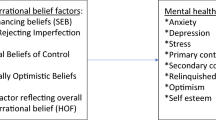Abstract
This article argues that two of REBT's central hypotheses, the core and the primacy of the musts hypotheses, are untestable. One reason that these hypotheses are untestable concerns the interdependence principle that REBT maintains. This principle suggests that cognitions, emotions, and behaviour are part of an interdependent system, and as such, none of the three elements of that system can be measured separately from the others. Due to this interdependence principle, it cannot be established that cognitions are at the core of psychological disturbance and health (the core hypothesis); furthermore, the interdependence principle prevents the primacy of the musts hypothesis from being examined, as well. This hypothesis states that of the four irrational beliefs purported by REBT theory, musts are at the very core of psychological disturbance and the other three irrational beliefs are derived from these musts. Irrespective of the interdependence principle and the core hypothesis, the primacy of the musts hypothesis is also apparently untestable due to the current inability to measure musts adequately.
Similar content being viewed by others
References
Bargh, J.A. (1982). Attention and automaticity in the processing of self-relevant information.Journal of Personality and Social Psychology, 43, 425–436.
Bargh, J.A., Bond, R.N., Lombardi, W.L., & Tota, M.E. (1986). The additive nature of chronic and temporary sources of construct accessibility.Journal of Personality and Social Psychology, 50, 869–879.
Beck, A.T. (1976).Cognitive therapy and the emotional disorders. New York: Meridian.
Burgess, P.M. (1990). Toward resolution of conceptual issues in the assessment of belief systems in rational-emotive therapy.Journal of Cognitive Psychotherapy, 4(2), 171–183.
Dryden, W. (1986). Language and meaning in RET.Journal of Rational-Emotive Therapy, 4(2), 131–142.
Dryden, W. (1994a). Reason and emotion in psychotherapy: Thirty years on.Journal of Rational-Emotive and Cognitive Behavior Therapy, 12(2), 83–99.
Dryden, W. (1994b).Invitation to rational-emotive psychology.London: Whurr Publishers.
Dryden, W. (1995).Preparing for client change in rational emotive behaviour therapy. London: Whurr Publishers.
Dryden, W., & Ellis, A. (1987). Rational-emotive therapy. In K.S. Dobson,Handbook of cognitive-behavioral therapies, New York: Guilford.
Dryden, W. & Trower, P. (1988).Developments in rational-emotive therapy. Milton Keynes: Open University Press.
Ellis, A. (1958). Rational psychotherapy.Journal of General Psychology, 59, 35–49.
Ellis, A. (1983).The case against religiosity: New York: Institute for Rational-Emotive Therapy.
Ellis, A. (1994).Reason and emotion in psychotherapy: Revised and updated edition. New York: Birch Lane Press.
Lazarus, R.S. (1991):Emotion and adaptation. New York: Oxford.
Orne, M.T. (1962). On the social psychology of the psychological experiment: With particular reference to demand characteristics and their implications.American Psychologist, 17, 776–783.
Author information
Authors and Affiliations
Additional information
Order of authorship was based upon the flip of a coin
Order of authorship was based upon the flip of a coin
Rights and permissions
About this article
Cite this article
Bond, F.W., Dryden, W. Why two, central REBT hypotheses appear untestable. J Rational-Emot Cognitive-Behav Ther 14, 29–40 (1996). https://doi.org/10.1007/BF02238092
Issue Date:
DOI: https://doi.org/10.1007/BF02238092




